 Joe Byron, the Director of Education for The Los Angeles Film School, is in his eighth year with the school. During his tenure with LAFS, Byron has held various titles including Associate Director of Education, Associate Dean of the LAFS Immersion Filmmaking Program, and Director of Technology.
Joe Byron, the Director of Education for The Los Angeles Film School, is in his eighth year with the school. During his tenure with LAFS, Byron has held various titles including Associate Director of Education, Associate Dean of the LAFS Immersion Filmmaking Program, and Director of Technology.
Byron joined The Los Angeles Film School in 1999 as Director of Technology, overseeing the acquisition of all portable filmmaking equipment. In addition to being a member of the creative committee that supervised the creation of the Immersion Filmmaking Program, he also taught the first class ever offered by the school.
In 2001, Byron served as Director of the Six Week program before becoming Associate Dean of the LAFS Immersion Filmmaking Program the following year. He then earned the title of Acting Dean in 2002 and became Associate Director of Education in 2003.
After graduating with honors with a BFA in design and production from the Drama School of Carnegie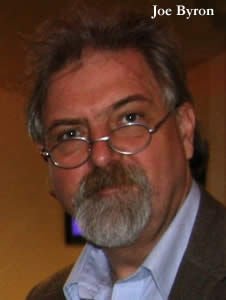 Mellon University, Byron launched a thirty-year career including: designing, building, lighting, and award-winning theatrical productions. His motion picture production experience includes: gaffer, lighting director, camera operator, and special effects technician for commercials, educational films, and features, including, Damnation Alley, Meteor, The Amityville Horror, and Raise the Titanic.
Mellon University, Byron launched a thirty-year career including: designing, building, lighting, and award-winning theatrical productions. His motion picture production experience includes: gaffer, lighting director, camera operator, and special effects technician for commercials, educational films, and features, including, Damnation Alley, Meteor, The Amityville Horror, and Raise the Titanic.
When not doing film or theatrical production, Byron serves as an Optical and Mechanical Engineer, and has been awarded seven patents for motion picture and lighting products. Despite his technical accomplishments, Joe is dedicated to the renaissance belief that technology is merely a tool of the artist, and has received Masters Degrees in Literature, Critical Theory, and Creative Writing.
Cinema Without Borders: Can you please tell us about the background of your school and how you became involved with it? 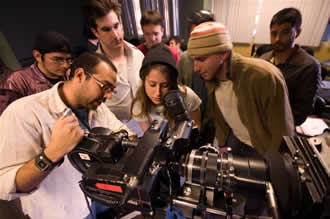 Joe Byron: The Los Angeles Film School was established in early 1999 by a group of talented artists, administrators, and financiers in a determined attempt to change the nature of filmmaking education in Hollywood. I like to think that that school was not conceived and built in a traditional business sense, but was rather “produced” much like a major motion picture. Specifically, concepts and ideas were discussed and decided, budgets and schedules were created, and top talent was recruited to pull it off. It is amazing to realize that it took only 6 months from the initial idea until September 1999, when the first class was held.
Joe Byron: The Los Angeles Film School was established in early 1999 by a group of talented artists, administrators, and financiers in a determined attempt to change the nature of filmmaking education in Hollywood. I like to think that that school was not conceived and built in a traditional business sense, but was rather “produced” much like a major motion picture. Specifically, concepts and ideas were discussed and decided, budgets and schedules were created, and top talent was recruited to pull it off. It is amazing to realize that it took only 6 months from the initial idea until September 1999, when the first class was held.
I became involved with the school primarily because I was in the right place at the right time. I responded to an intriguing call from one of the original founders who was looking for someone familiar with filmmaking technology, specifically that of cinematography and sound. I called for an interview, and knew as soon as arrived and saw the construction and activity that it was going to be something special. I was told that my 30 years experience in the film industry combined with the fact that I was a poet got me the job.
CWB: What is the essence of your program and in what fields do you train the students?
JB: The program is a one-year practice session of what it is like to work in the Hollywood filmmaking industry. The “practice” part of this de scri ption is important as we supply a supportive, but realistic environment that enables the student to understand the demands of the jobs and also forgives beginner’s mistakes. Any person fortunate enough to get a job in the industry will quickly lose it if he or she doesn’t measure up. Reputations spring up quickly and can stick to one forever.
important as we supply a supportive, but realistic environment that enables the student to understand the demands of the jobs and also forgives beginner’s mistakes. Any person fortunate enough to get a job in the industry will quickly lose it if he or she doesn’t measure up. Reputations spring up quickly and can stick to one forever.
The specific fields of specialization of the school’s program are producing, directing, writing, cinematography, production design, editing, and sound. We begin every new group with an intensive overview of all the areas. This enables us to work with those who have no background or experience in filmmaking, while allowing those who do have experience to work on creative concerns. It also gives us the opportunity to teach a communicative vocabulary and stress the importance of creative collaboration.
CWB: Does the school give out any kinds of degrees, diplomas or certificates to the school graduates?
JB: The school is fully accredited and licensed to offer a completion certificate.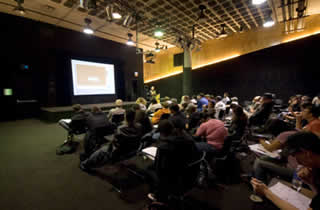 CWB: Do the students make any films as parts of school projects?
CWB: Do the students make any films as parts of school projects?
JB: Every student will make at least seven short films, and will work on many more. Some are shot in classroom sessions under supervision, some are shot independently and on location. These projects will vary in length from a few minutes, to 12-15 minutes and many will use professional formats including 16mm & 35mm film and HD.
Unlike many film schools, most of these project or thesis films are produced by the students, therefore the student keeps the rights to the films.
CWB: Are your students exposed to international and independent cinema?
JB: Yes, of course. I’m sad to say that without international and independent films, our industry would be pretty stagnant and shallow.
CWB: Are any of your graduates working in the industry now?
JB: In order to keep our accreditation, 71% of our graduates must get work in the industry within the first year. We actually do better than that. We have a fully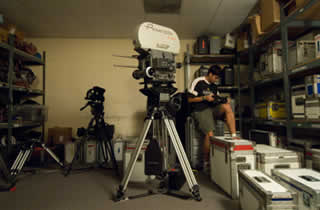 staffed Career Development Department that assists students after they graduate. We feel that this is a great accomplishment, as many young filmmakers are more interested in investors than they are traditional jobs.
staffed Career Development Department that assists students after they graduate. We feel that this is a great accomplishment, as many young filmmakers are more interested in investors than they are traditional jobs.
CWB: Are there any arrangements between the school and film production companies to use your students as interns?
JB: We recently reached an agreement with Legendary Pictures to take on interns who had completed our certificate program. Legendary has a 25 picture deal with Warner Brothers and has already mad several blockbuster films including 300, Batman Begins, and Superman Returns. There are many more 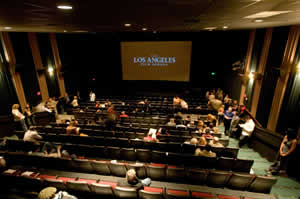 intern opportunities currently under development.
intern opportunities currently under development.
CWB: Are there any events or competitions that the school arranges or is a part of?
JB: We regularly co-host screenings with the Visual Effects Society, sponsor panel discussions with companies like AVID, Sony, and Canon, and participate in various ways in festivals both locally and internationally. We have also worked with local guilds, unions, and societies like BAFTA with special events and training sessions.
CWB: Please tell us about future plans for your school.
JB: We are growing. In the seven years that we have offered classes, the name The Los Angeles Film School pops up with the likes of USC and AFI. Keep an eye on our website: www.lafilm.com, for coming announcements.

